NordVPN vs. IPVanish VPN: Which is better in 2022?
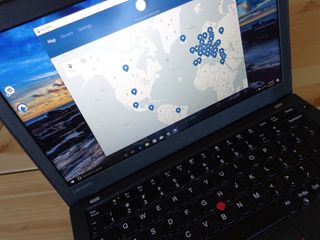
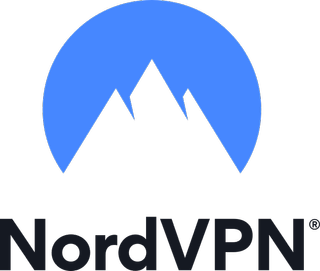
More security features
NordVPN has over 5,200 servers in 59 countries throughout the world. Its service supports 256-bit AES encryption; the IKEv2 and OpenVPN protocols; simultaneous connections for up to six of your devices; and unlimited bandwidth.
For
- Unlimited bandwidth
- Two VPN protocols supported
- Apps for six OSes
- Extensions for browsers
- Double VPN
Against
- Only up to six simultaneous connections
- Doesn't list number of shared IP addresses
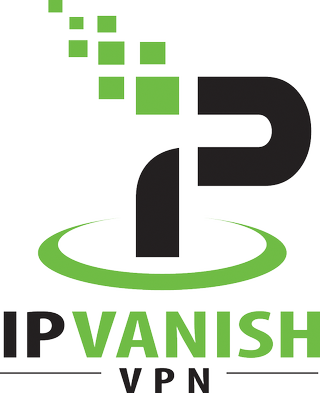
Connect more devices
IPVanish has over 1,300 servers in over 75 locations throughout the world, and uses over 40,000 shared IP addresses. Its service supports 256-bit AES encryption; the IKEv2, L2TP/IPsec and OpenVPN protocols; simultaneous connections for up to 10 of your devices; and unlimited bandwidth.
For
- Up to 10 simultaneous connections
- Unlimited bandwidth
- Three VPN protocols supported
- Apps for six OSes
Against
- No browser extensions
- No double VPN
What is a VPN?
Virtual Private Networks (VPNs) help you maintain a bit of privacy and security while navigating the internet. They act as an encrypted tunnel network that shuttles data from your PC to the open internet, hitting a specific server before going out into the world.
The main differentiators that set VPNs apart from each other are the number of servers each has throughout the world, whatever apps it provides that help you to easily access use it on your computer or mobile device, and extra security measures (such as features, tools in its apps, and company policies) it has to protect its users' privacy.
NordVPN and IPVanish are both top choices when it comes to VPN services, but you're no doubt trying to narrow it down to just one. Let's take a look at some of the important differences and similarities to help you decide between the two.
NordVPN vs. IPVanish VPN: Log keeping
One of the most important aspects of a VPN is its stance on log keeping. Despite helping keep your privacy intact from other interested parties, VPNs that keep track and log your activity are not preferred. Why? Outside parties can get ahold of those logs, essentially eliminating the work of the VPN. In the case of NordVPN and IPVanish, both services promise to keep no logs.
IPVanish, for example, states:
IPVanish does not collect, monitor, or log any traffic or use of its Virtual Private Network service, under any circumstances, on any platform,
In order to bill you and to ensure you retain service, an account is required. Other than that, IPVanish says it doesn't keep track of you. Keep in mind that IPVanish is located in the U.S., a country with aggressive surveillance agencies.
NordVPN is similar, saying:
Get the Windows Central Newsletter
All the latest news, reviews, and guides for Windows and Xbox diehards.
"We do not track the time or duration of any online session, and neither do we keep logs of IP addresses or servers used, websites visited or files downloaded. In other words, none of your private and secure data is logged and gathered at any time.
NordVPN says that it cannot give in to any information requests, simply because it does not keep that information. The service is based in Panama, which happens to have no laws requiring data retention.
NordVPN vs. IPVanish VPN: Servers and locations
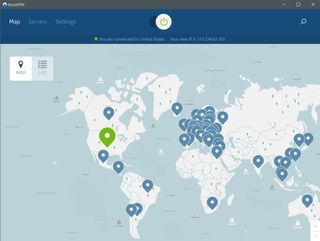
A good VPN service should have a large number of servers to choose from, allowing you to get a solid, fast connection no matter where you are, as well as allowing you to masquerade as an individual located in a different country.
In the case of NordVPN, you have over 5,200 servers to choose from, spread out over 59 countries around the world. Some countries will have extra features included with their servers — P2P, Double VPN, etc. — while others will use a simple VPN hookup to mask your identity. The most servers are located in Europe with 2,483 servers in countries that include the U.K., Netherlands, Germany, France, and Sweden. The Americas are second with 2,024 servers in countries that include the U.S., Canada, Brazil, Argentina, and Mexico. Among all the countries in the world, NordVPN has the most servers in the U.S. followed by the U.K.. The company doesn't list how many shared IP addresses their VPN uses.
You can even get a dedicated IP address for an extra $70 per year that's located in France, Germany, the Netherlands, U.K. or U.S..
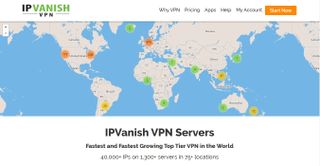
Though it has servers in more than 75 locations throughout the world, IPVanish falls behind server count with just over 1,300. The most are in the Americas with 699 servers in the U.S., Canada, Mexico, and Costa Rica. Europe is second with 470 servers in countries that include the U.K., Netherlands, Germany, France and Italy. Among all the countries, IPVanish has the most servers in the U.S. followed by the U.K.. IPVanish also has over 40,000 shared IP addresses.
If you plan on operating mostly in Europe or North America, either VPN service will likely do, but NordVPN edges out IPVanish for most other parts of the world.
NordVPN vs. IPVanish VPN: Performance
We reviewed both NordVPN and IPVanish, and during the process tested the servers in both the morning and in the evening. Comparing results, performance is essentially the same across the board. In some cases, you might see a small decrease in speed (depending on where the VPN server is located), and in others you might see a small increase in speed. Overall, performance is a draw.
However, remember that the performance of a VPN service depends on where you are in the world and where a server belonging to that VPN that you connect to is located. (So a tip: When looking at a VPN service to consider, be sure the company has a money-back guarantee within a certain number of days after you sign up. This will allow you to try its service and determine if its network's performance will work for your needs long-term.)
NordVPN vs. IPVanish VPN: Devices
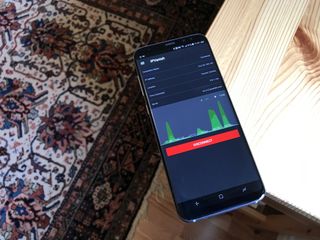
If you only have one device you'd like to use with a VPN, either service will do; however, most people these days have multiple devices, which is why quality VPN services allow simultaneous connections under the same account.
IPVanish allows for up to 10 simultaneous connections under one account. There's a caveat: Only one device can connect using PPTP or L2TP, while the other devices must use OpenVPN, IKEv2, or IPSec. This isn't a big deal, as you'll no doubt want to stick to the latter three protocols for best performance. You can likewise use IPVanish with a DD-WRT or Tomato router, meaning any device connected to that router will receive the same VPN protection.
As for NordVPN, you can use it on up to six devices at once under the same account. Like IPVanish, NordVPN can be used with a router to cover all connected devices, but if you're looking for basic device functionality without extra work, IPVanish is the winner.
NordVPN vs. IPVanish VPN: Bandwidth limits
Using a VPN to maintain privacy, only to be informed that you've reached a bandwidth limit, just won't do. You'll generally encounter this issue if you're using a free VPN, but here you won't have to worry.
Both IPVanish and NordVPN offer unlimited bandwidth without throttling. You're free to connect to a VPN server and keep it on as long as you want.
NordVPN vs. IPVanish VPN: Features and apps
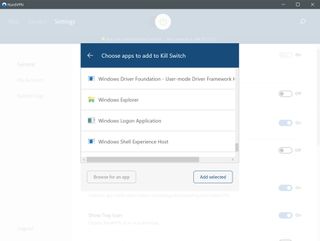
NordVPN has a lot of extra goodies that most users can appreciate, including a double VPN system that creates an added layer of privacy (great for anyone threatened by political powers), a CyberSec filter that blocks ads and malicious websites, Onion access, and dedicated P2P servers for file sharing.
Both VPN services offer kill switches and have built-in measures to stop DNS leaks, and both services offer apps and clients for most popular devices. However, IPVanish does not have dedicated servers for P2P sharing, nor does it have a live chat option if you need assistance. You can email (and you should receive a prompt reply), but NordVPN has a live chat option. As far as features go, NordVPN comes out ahead.
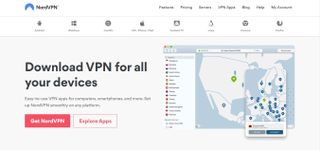
Apps are provided to help you set up and use NordVPN on Android, Android TV, iOS, Linux, macOS, and Windows devices. There are also extensions for Chrome and Firefox to let you use NordVPN through these browsers. These apps incorporate an ad and malicious site blocker, and a kill switch that will block web access to your device if its connection to the NordVPN network drops. Other included features are double VPN and easy-to-use streaming of region-restricted video.
Apps are provided to help you set up and use IPVanish on Amazon Fire TV, Android, Chrome OS, iOS, macOS, and Windows devices. A kill switch in these apps will block web access to your computer or device if its connection to the IPVanish network drops. If you connect via the OpenVPN protocol, another feature that's included will try to circumvent firewalls that have been configured to detect and terminate OpenVPN connections.
NordVPN vs. IPVanish VPN: Pricing and plans

NordVPN has four plans to choose from, each with a 30-day money-back guarantee if you don't like the service. A three-year plan is the best deal, as you'll only pay about $3.49 per month. This plan comes with three months free. With the two-year plan, you'll pay about $5 per month. There's also a one-year plan that comes out to about $7 per month, and there's a one-month plan where you pay about $12.

IPVanish has three plans to choose from with a seven-day money-back guarantee. A yearly plan costs about $6.49 per month, a three-month plan costs about $9 per month, and a monthly plan costs about $10.
If you plan on operating on a month-to-month basis, IPVanish will be a couple dollars cheaper, but NordVPN will take less of your money on a monthly basis.
Conclusion
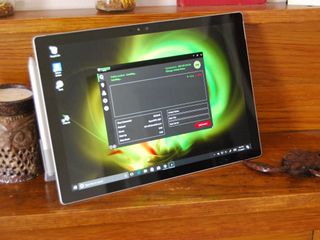
Both of these VPN services have a lot to offer, including strong encryption, no logs, and knockout performance, and either one will make a good addition to your privacy repertoire. However, if you want access to a large number of servers throughout the world, then it comes down to NordVPN. This is also the one you should consider if you'd like to be able to use double VPN to further secure your online privacy. You can also pay for a dedicated IP address, and it will cost a bit less per month if you decide to jump on a long-term plan.

Broad OS support and security options
NordVPN has over 5,200 servers with most of them in Europe. The country with the most servers is the U.S. followed by the U.K.. The company's support for several OSes and web browsers is impressive, as are its extra security features that include double VPN and access to the Onion network.

Connect up to 10 devices
IPVanish has over 1,300 servers in over 75 countries throughout the world. Its VPN lets you connect up to 10 devices to it. Apps supporting six OS platforms are provided to help you get your device on its VPN.
We test and review VPN services in the context of legal recreational uses. For example:
1. Accessing a service from another country (subject to the terms and conditions of that service).
2. Protecting your online security and strengthening your online privacy when abroad.
We do not support or condone the illegal or malicious use of VPN services. Consuming pirated content that is paid-for is neither endorsed nor approved by Future Publishing.

